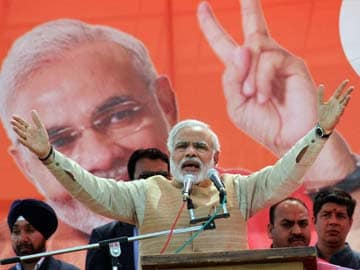
Narendra Modi campaigning for the national election
New Delhi:
Narendra Modi today said he was never silent on the 2002 riots in his Gujarat, but no one ever tried to "understand the truth," which he blamed on a conspiracy.
"I was not silent. I have said what I had to on the riots. I answered every top journalist in the country from 2002 to 2007, but noticed there was no exercise to understand the truth. It was an unknown entity causing conspiracies," he told the ANI news agency today.
Mr Modi, the BJP's prime ministerial candidate, has expressed regret for the communal violence 12 years ago in Gujarat, the state he has ruled since 2001, but has never apologised. In the middle of a national election that many believe will catapult him to power, the 63-year-old has repeatedly faced questions on demands for his apology.
He said he "felt very hurt" by allegations against him, but gradually learned how to cope with them.
A Supreme Court appointed probe panel found no evidence of his alleged complicity in the riots, and a Gujarat court agreed with that assessment last year.
But Mr Modi's critics accuse him of not doing enough to check the riots that left a deep scar on his party's relationship with the Muslim community.
On a day images of BJP chief Rajnath Singh wearing the traditional Muslim cap at a shrine in Lucknow sparked a debate, Mr Modi made it clear that this was something he would never do.
"I will not wear any symbol of appeasement for a photo op. Does Sonia Gandhi wear a skull cap?" he questioned, when asked about his refusal to wear a traditional Muslim skull cap offered by a cleric in 2011, an episode that is cited by many of his critics as a sign of his hardline stance.
Mr Modi also predicted a historic victory for his party. "As far as election results are concerned, I worked as backroom boy for the party for many years. I have never measured elections in numbers, but after looking at poll strategies I can say this will be the worst performance in Congress history and the BJP and NDA's best performance," he said.
"I was not silent. I have said what I had to on the riots. I answered every top journalist in the country from 2002 to 2007, but noticed there was no exercise to understand the truth. It was an unknown entity causing conspiracies," he told the ANI news agency today.
Mr Modi, the BJP's prime ministerial candidate, has expressed regret for the communal violence 12 years ago in Gujarat, the state he has ruled since 2001, but has never apologised. In the middle of a national election that many believe will catapult him to power, the 63-year-old has repeatedly faced questions on demands for his apology.
He said he "felt very hurt" by allegations against him, but gradually learned how to cope with them.
A Supreme Court appointed probe panel found no evidence of his alleged complicity in the riots, and a Gujarat court agreed with that assessment last year.
But Mr Modi's critics accuse him of not doing enough to check the riots that left a deep scar on his party's relationship with the Muslim community.
On a day images of BJP chief Rajnath Singh wearing the traditional Muslim cap at a shrine in Lucknow sparked a debate, Mr Modi made it clear that this was something he would never do.
"I will not wear any symbol of appeasement for a photo op. Does Sonia Gandhi wear a skull cap?" he questioned, when asked about his refusal to wear a traditional Muslim skull cap offered by a cleric in 2011, an episode that is cited by many of his critics as a sign of his hardline stance.
Mr Modi also predicted a historic victory for his party. "As far as election results are concerned, I worked as backroom boy for the party for many years. I have never measured elections in numbers, but after looking at poll strategies I can say this will be the worst performance in Congress history and the BJP and NDA's best performance," he said.
Track Latest News Live on NDTV.com and get news updates from India and around the world

